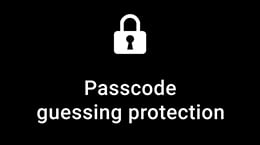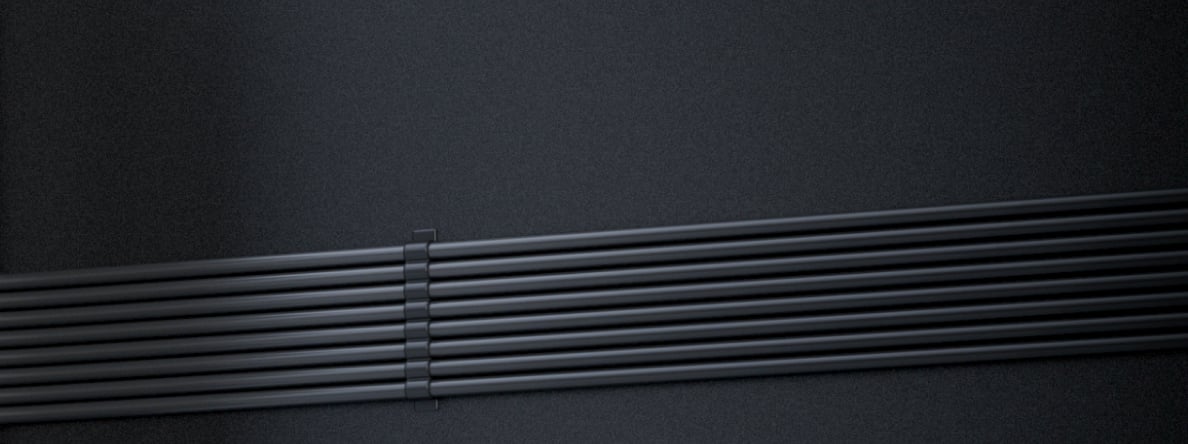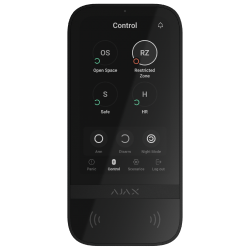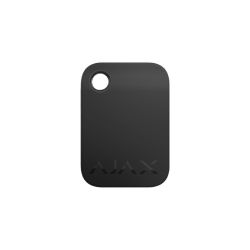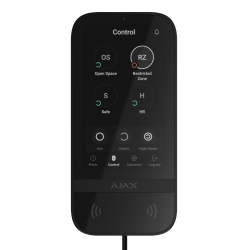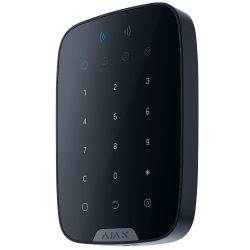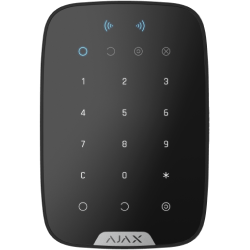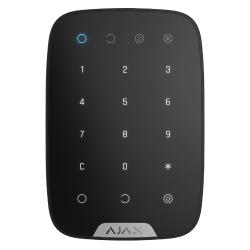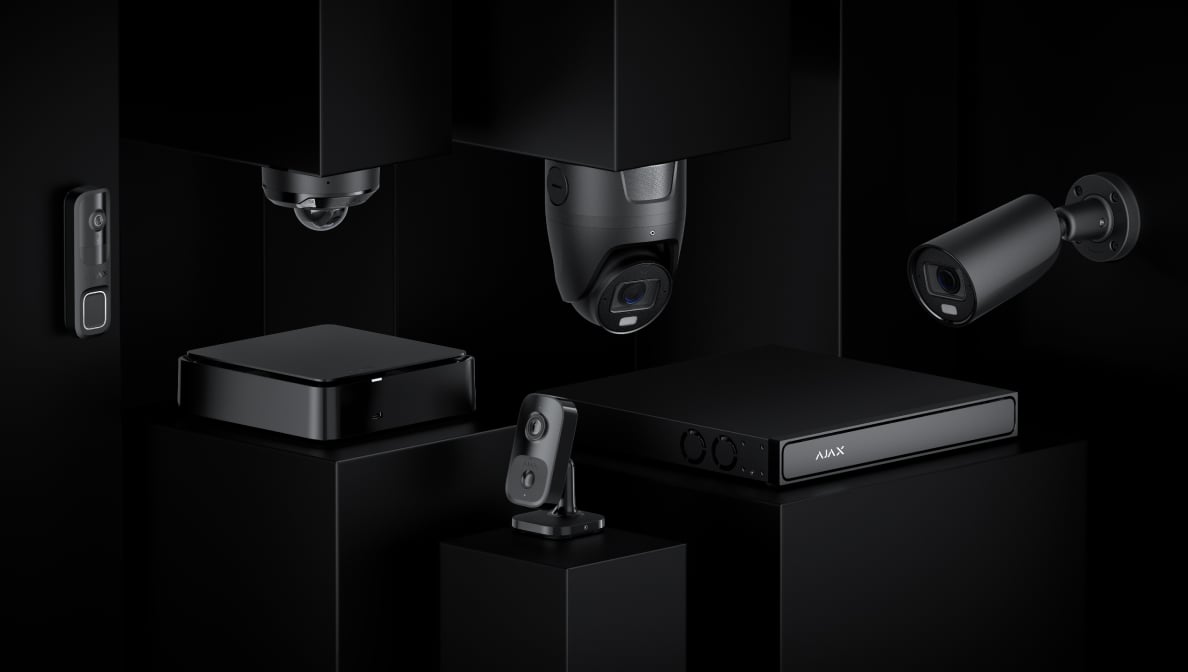
Superior KeyPad Fibra
Wired keypad with touch buttons
Control simplicity at its best
Superior KeyPad Fibra is a reliable, easy-to-use tool for managing security and automation devices. With multiple code options, the keypad offers transparent control over a facility. The built-in panic button and duress code make the device indispensable in emergencies. Its sleek, minimalist design appeals to end users, while PROs benefit from easy installation. All settings are configurable remotely via Ajax apps.
Key features
In an Ajax system, you can combine devices of all product categories: Intrusion protection, Video surveillance, Fire and life safety, or Comfort and automation. Create the system to suit your needs and manage it in a single interface.
Superior products are available exclusively to accredited Ajax Systems partners for sales, installation, and maintenance, creating a protected, high-value revenue channel.
Suitable for any location
Where control meets flexibility
Superior KeyPad Fibra utilizes multiple types of access codes for user authentication and system control. Each code entry and user action is logged and displayed in Ajax apps. The apps also allow PROs and users with admin rights to create and configure access codes at any time without visiting the site.
Keypad code
The keypad code enables multiple users to control the system. Since this code is general, all actions performed with it are logged under the keypad name. Each Superior KeyPad Fibra can have its own general code, or the same code can be assigned to multiple keypads within a facility. This ensures easy access across different entry points.
- A single code for one or several keypads
- Events logged under the keypad name
- Changed by a PRO or user with admin rights

User code
Superior KeyPad Fibra allows users to set personal codes. This can be done via Ajax apps without assistance from an installer or admin, reducing the risk of code exposure. Actions performed with a user code are logged under the user’s name, and the CMS receives notifications with the user ID. As a result, this ensures traceable control over the facility.
- Unique code for each user
- Events logged under the user’s name
- Changed by a user

Unregistered user code
Superior KeyPad Fibra supports up to 99 codes for users without Ajax accounts. They are meant to eliminate the need to create accounts for temporary users, such as cleaning services or realtors. Instead, a code can be assigned in the hub settings in just a few clicks. In this case, actions are logged under the assigned code name.
- Codes for users without Ajax accounts
- Events logged under the assigned code name
- Changed by a PRO or user with admin rights

RRU code
Superior KeyPad Fibra supports special codes for rapid response units (RRUs). These codes enable quick access to the facility in case of an alarm. Created and configured by a PRO or user with admin rights, RRU codes are activated only after an alarm and remain valid for a specified period. This ensures they are used exclusively in emergencies.
- Designed for rapid response units
- Activated only when an alarm is triggered
- Valid for a specific period
- Created and configured by a PRO or user with admin rights

Discover future-proof hardware
Ready to assist in emergencies

The user triggers an emergency alert

The system transmits the alarm

The security company dispatches a rapid response unit
Superior KeyPad Fibra features a function button that can be used as a panic button in emergencies. Pressing it sends an alarm notification to the CMS and other users via Ajax apps. The button can also trigger automation scenarios, such as locking roller shutters or activating a smoke machine to deter intruders.
For added security, Superior KeyPad Fibra supports duress codes. If a user is forced to disarm the system by an intruder, they can enter a duress code. This simulates disarming while discreetly alerting the CMS and other users to the emergency. The keypad, Ajax apps, and facility sirens remain silent, giving no indication of alarm activation to avoid endangering the user.
Panic button for emergency alerts
Duress codes for silent alarms
Reinforced security and comfort
Superior KeyPad Fibra can run automation scenarios triggered by arming/disarming. This allows for minimizing routine tasks or enhancing protection, depending on user needs. For example, arming the system can automatically lock the electric lock and shut off utilities. Meanwhile, disarming can open roller shutters and turn on the lights. Pressing the panic button can also trigger a scenario, such as activating a fog machine.

Fibra
Unique wired technology
Fibra is Ajax’s proprietary technology for secure two-way communication between devices and a hub or module that extends the Fibra line. Fibra features encryption and device authentication to prevent sabotage, spoofing, and data theft. The Fibra line supports all types of devices, including sirens, keypads, and detectors with photo verification.

Communication range of up to 6,550 ft
One Fibra line for different device types
Photo delivery via Fibra line without interference
Protection against sabotage and spoofing
Energy efficiency as a priority
Fibra communication requires minimum power consumption: the keypad consumes only up to 0.23 W at its peak. Fibra also follows the TDMA principle. Each device has a short time frame to exchange data with a hub, and its communication module is inactive the rest of the time. This significantly reduces power consumption and helps avoid interference even when multiple devices communicate simultaneously.
Up to 60 hours of battery life for a system of 30 devices
Power consumption of up to 0.23 W
TDMA and power-saving modes

Advanced system supervision
The keypad is a part of the Ajax ecosystem, which makes it a genuine IoT device. Each element of the ecosystem is constantly supervised. The keypad exchanges data with a hub via Fibra protocol. The hub has two-way communication with Ajax Cloud, which provides real-time information to Ajax apps. The Ajax system supervises device state regularly. If a malfunction or communication failure occurs, the CMS is immediately notified to arrange necessary maintenance.
IoT device
Setting the ping interval in the hub settings
Instant maintenance notifications

Sabotage resistance








Next-level protection of Fibra line
Introducing Superior LineProtect Fibra, the module designed to protect an Ajax hub and connected wired devices from sabotage when intruders cause overvoltage, short circuits, apply 110/230 V~, or use stun guns.
PRO is king
Installing wired systems is no longer a challenge. Ajax has made the process much easier for PROs by providing a complete set of tools that simplify everything from project design to installation, client support, and system maintenance. There is no need to disassemble the device for installation. With intuitive Ajax apps, adding devices to the system is simple, and they can be reconfigured remotely at any time.
Fibra power supply calculator
This online tool provides security engineers with detailed data on devices’ power consumption, enabling easy pre-installation assessment of a wired system project. The calculator helps design the project in real time, highlights problem spots, and offers solutions. Results can be downloaded as a PDF file.
With the SmartBracket mounting panel, an installer can effortlessly mount the device on the wall. The installation kit includes all the necessary fasteners. There is no need to disassemble the device: the board with terminals is placed outside the enclosure under SmartBracket to eliminate hardware damage during installation. The board is removable, which makes the whole process nice and easy. SmartBracket also features a cable channel to neatly secure the wires. Additionally, a special screw keeps the keypad firmly attached to SmartBracket.
No need to disassemble the device’s enclosure
Removable terminal board
All the necessary fasteners included in the installation kit
Holding screw to secure the device on a mounting panel

The device is paired with a hub automatically via Fibra line scanning. This feature is available in the Ajax PRO Desktop app and Ajax PRO: Tool for Engineers mobile app. Also, there is an option to scan the device QR code or enter the ID to pair with a hub. After that, all the installer has to do is to assign a name, room, and security group to the device.
Pairing with a hub via automatic line scanning or QR code
Device identification via triggering or LED indication
Optimal default settings to cover major requests
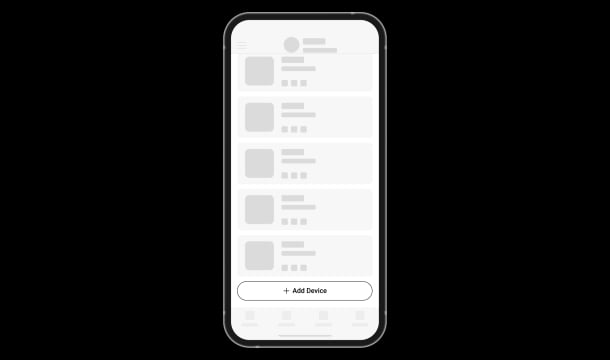
Intuitive Ajax apps provide remote setup and testing with all device information from anywhere in the world. All you need is an internet connection, smartphone, or PC. An installer can change settings and provide services remotely in no time, so visiting facilities is not needed.
Configuration and testing remotely or on-site
iOS, Android, macOS, and Windows apps
Accounts for companies and installers
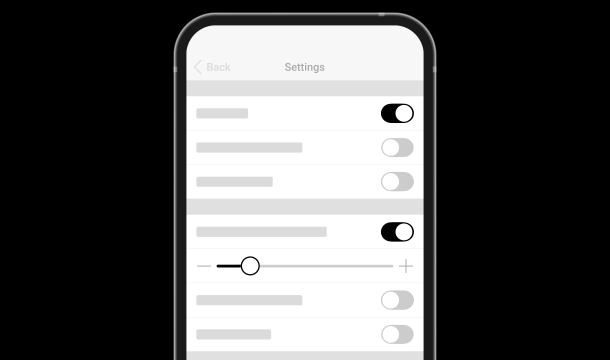
An Ajax system transmits alarms to the Ajax PRO Desktop app or any third-party CMS. A monitoring company receives alarm notifications in less than a second. They include all the necessary information: the device name, event time, and the exact room where the device is installed. A monitoring company also receives photo or video verification of the alarm to understand what caused it.
Full addressability of connected devices
Instant notifications
Alarm and event monitoring with Ajax PRO Desktop or third-party CMS

With U/UTP cat.5, 4×2×0.51 mm cable. Other cable types may have different values. Please use our Fibra power supply calculator to check the wired system project before installation.
Technical information
Superior KeyPad Fibra
More KeyPad models
Ajax product categories
In an Ajax system, you can combine devices of all product categories: Intrusion protection, Video surveillance, Fire and life safety, or Comfort and automation. Create the system to suit your needs and manage it in a single interface.
The keypad in security system
An alarm keypad is a control panel designed to transmit information about the operation of devices connected to the system and to arm/disarm an object. Keyboards are often capable of alerting people to security breaches and alarms.Security keypads are wired, wireless, interface and relay, liquid crystal and LED. There are also touch keyboards and virtual keyboards that are installed in a mobile phones.Keypads for disarming and arming rooms differ in their capabilities, methods of transmitting an alarm signal, and the type of connection to the security system central. The choice of the security control panel is influenced by the frequency with which the device will be used, the type of object where the keyboard is installed, the purpose of installing the device, etc.
The principle of operation of the security keypad
From the alarm keypad, you can set the security mode, turn it on and off. To do this, you need to enter a password, which is set by the owner of the protected object, so that no outsider can control the security system. Using the security keypad, you can program security system sensors, passwords, add phones for SMS messages about events, and other functions, depending on the type of keypad.
Security keypad features
The security alarm keypad allows you to select the desired operating mode. The device notifies users of the security system of an unforeseen situation and simplifies the use of the alarm system. Each type of security keyboard has a number of features, the main of which are:Wired security keypad
- connects to the control panel (alarm central) with a wire;
- installed at the initial stage of repair, since the wires need to be hidden;
- often used in buildings with thick partitions, reinforced concrete walls, where the radio signal may not pass.
Wireless keypad for alarm:
- communication with the control panel is maintained by radio signal;
- receives power from pre-installed batteries or an accumulator;
- you can mount it even after the repair is completed, since wireless keyboards do not require wiring.
The alarm LED keypad is the easiest to operate and only provides basic information. Liquid crystal, in turn, allows you to send text messages and is more convenient to use, although equipped with complex functionality.Features of the relay keyboards:
- compatible with control panels of any kind;
- operate on the principle of closing and opening an electrical relay.
Features of the interface keyboards:
- interface keyboards transmit information to the control panel in an encrypted form, which eliminates signal interception and device forgery;
- they allow monitoring of the status of communication devices, security zones and others.
Wired indoor keyboard Superior KeyPad Fibra
Wired touch keyboard to control the Ajax security system, Superior KeyPad Fibra is designed for indoor installation. The keyboard works with the Superior Hub Hybrid control panel. Connection to other control panels, integration modules, radio signal repeaters is not provided. Integration with third-party security systems is not provided.
The principle of operation of the wired Superior KeyPad Fibra keyboard for alarm
Wired touch keyboard Superior KeyPad Fibra is an Ajax security system control device. The device communicates with the control panel using the secure Fibra protocol, and the wired communication range is up to 2 kilometers when connected via a U/UTP cat.5 twisted-pair cable.The Superior KeyPad Fibra wired touch keyboard allows you to control the security modes of the entire facility or individual groups, activate the Night mode and supports the “silent alarm” function — this is the ability to inform the security company that someone is forcing you to disarm the alarm. The siren will not react at the same time — you need to enter a pre-created password for such a situation instead of the usual one.The wired security keypad supports both a shared duress code and a personal code — the second can be set individually in the user settings.The Superior KeyPad Fibra wired alarm keypad also supports control of security modes without entering a code. To do this, you need to activate the "Arm without code" function in the settings.
Superior KeyPad Fibra wired touch keyboard features
The Superior KeyPad Fibra security keyboard has the following features: The "Function" button. The "Function" button on the Superior KeyPad Fibra wired touch keyboard can work in 3 modes:
- No action — means that the button is disabled, and nothing will happen after pressing it.
- Alarm — after pressing the “Function” button, the security system will send an alarm signal to the central monitoring station of the security company (CMS), system users and activate the sirens.
- Suppress synchronous fire alarm — after pressing the "Function" button, the security system will disable the alarm from the FireProtect / FireProtect Plus fire detectors. The operation can be carried out only if the Synchronous alarm of fire detectors is enabled.
Setting up in two stages
Arming the security system using the Superior KeyPad Fibra touch keyboard can be done in two steps. This process is similar to arming a security system using a personal or shared keypad code. The process must be completed either by re-arming using the Ajax SpaceControl control device, or by resetting the end sensor.
Blocking in case of invasion
If you enter the wrong code three times within one minute, the keyboard will be blocked for the time previously specified in the settings. During blocking of the device, the control panel will ignore all codes, and will notify alarm users about code selection attempts.The keyboard can be unlocked through the app by a PRO with administrator rights or by a user. After the time specified in the settings, the keyboard will unlock automatically.
Fibra data transfer protocol
To transmit alarms and events to the control panel, the wired keypad uses Fibra technology, a two-way communication protocol that provides reliable and fast communication between the control panel and devices connected to the security system. Fibra delivers alarms and events instantly, even if 100 devices are connected to the system thanks to the bus connection method.Fibra verifies every communication session with system devices and supports signal block encryption to prevent sabotage and keyboard substitution. The wire protocol provides for regular polling of devices by the control panel at a specified frequency, to control the quality of communication and to display the status of system devices in real time in Ajax applications.
Choosing a location and installing the Superior KeyPad Fibra wired sensor keyboard
Superior KeyPad Fibra is a touch keyboard for the Fibra line of wired devices. Only accredited Ajax partners can install, sell and maintain these devices.When the installation engineer chooses where to install the alarm touch keyboard, he will take into account the length of the cable to connect the device, the Fibra signal strength and general guidelines for device placement. For example, a keypad for controlling a security system is most conveniently used in an indoor entrance area. This arrangement allows you to disarm before the entry delay expires, as well as quickly activate the armed mode when leaving the premises.
Where not to install the touch keyboard of the Superior KeyPad Fibra security system
For the correct operation of the Superior KeyPad Fibra wired keyboard, the following places for mounting the device should be avoided:
- Rooms with humidity and temperature that are out of range. The device may stop working.
- Locations where furniture, clothing, Ethernet wire, or power cables can block the keyboard.
- Outdoors, as the device is designed for indoor use.
- Locations where the signal strength of the keyboard is weak or unstable.

